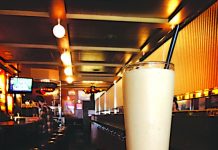
Creating good coffee is complicated. Fortunately, a growing number of metro Detroit roasters are making buying a great cup of coffee a simple pleasure.
Independent cafés and caffeinated chains permeate the metro area. But only a handful of local companies roast the beans. And since the contiguous United States doesn’t grow coffee, roasting is Americans’ best opportunity to shape the flavor of your morning cup.
“We’re always trying to elevate coffee to the level that people think about wine,” says James Cadariu, co-owner of Great Lakes Coffee Roasting Co, which opened a café/bar in Midtown in July. Great Lakes was founded in 1994 by Greg and Lisa Miracle. Lisa’s father was from Calabria, Italy, and the couple imported a roaster straight from the boot, eventually growing to supply Ann Arbor’s Mainstreet Ventures restaurants, Mudgie’s in Corktown, Café Via in Birmingham, and Royal Oak’s Café Muse, among many others.
The Midtown venture allows the Great Lakes team to serve its coffee direct to consumers, and they’re excited for the possibilities it holds. Cadariu, who started as roast master for the company, says the café’s new roasting machine would feature ribbon-burner technology and spin its motors at different speeds, allowing for greater control of the roasting process.
“A lot of coffee is roasted too dark in order to mask flaws,” Cadariu says. “We want to coax out the natural sweetness and distinctiveness. Coffee is constant experimentation.”

Great Lakes was the third roaster to set up shop in the city this year. The Germack Coffee Roasting Co. opened in March in Eastern Market in the old Rafal Spice building. Patrons can sip their brews made from beans roasted on-site while they wander the market’s sheds or take a seat along the small café’s exposed brick walls. Anthology Coffee opened in February in temporary digs at the Museum of Contemporary Art Detroit (MOCAD). A permanent location is being built on Michigan Avenue at Rosa Parks Boulevard, but there wasn’t a concrete opening date at press time.
Suburban dwellers have roasting options, too. There’s Commonwealth in Birmingham and Chazzano Coffee opened in Ferndale in 2009.
Chazzano owner Frank Lanzkron-Tamarazo developed his passion for roasting 15 years ago after buying a small coffee roaster. “I roasted just a couple of ounces, a batch from Costa Rica,” he says. “It was the best cup of coffee I’d ever had. It was nutty, it was chocolaty, and I was hooked.”
Chazzano grew from three accounts in late 2009 to more than 120 today, including Bacco Ristorante and Sweet Lorraine’s. Lanzkron-Tamarazo credits his growth to this commitment to roasting coffee fresh-to-order in a 12-pound roasting machine, which patrons of his café on Ferndale’s eastern edge can watch in action, and delivering it that day.
“What I love about coffee roasting is you have this whole palette of colors to work with,” he says. “All my importers send me samples, and there are tons of new coffees all the time. I really have to taste every single one. They can be from the same farm, the same mountain, but different altitudes will give you different coffees. I’ll roast 1 pound and sample it light, medium, and dark. The question always is, ‘Is this coffee something so special it’s going to make my customers smile?’ ”

Roasting may be a growing trend, but Michigan established itself as a roasting state long ago: Plymouth-based Coffee Express Co. began roasting coffee in 1982. Owner Tom Isaia spent hours in the library, reading books on techniques. Today, he roasts in a 9,000-square-foot facility and supplies numerous local grocery stores and cafés, including Avalon International Breads, Café con Leche, and Plum Market.
“I started in 1975 selling cappuccino machines,” Isaia says. “The machine was really captivating. But it took a while for people to figure out the coffee itself. Fast-forward 40 years and you have all these people who are really into the coffee.”
Some people “like Dunkin’ Donuts or Tim Hortons — there’s such a wide spectrum,” Isaia says. “Just like chefs have an understanding of what they want to do but have to understand their audience, it’s the same with coffee. You try to take the drinker with you on that journey. We want to prod the drinker.”
Like fine wine, exceptional coffee can be intimidating to the typical consumer. But local roasters say, fear not.
“We’re really trying to create great, unique coffee experiences,” says Josh Longsdorf of Anthology. “We don’t try to make people get what we’re doing. If you walk up, you can just have a cup of coffee. If you want to dive into it further, we’ll dive into it with you. We’re there to make people a great cup of coffee.”
|
|
|









